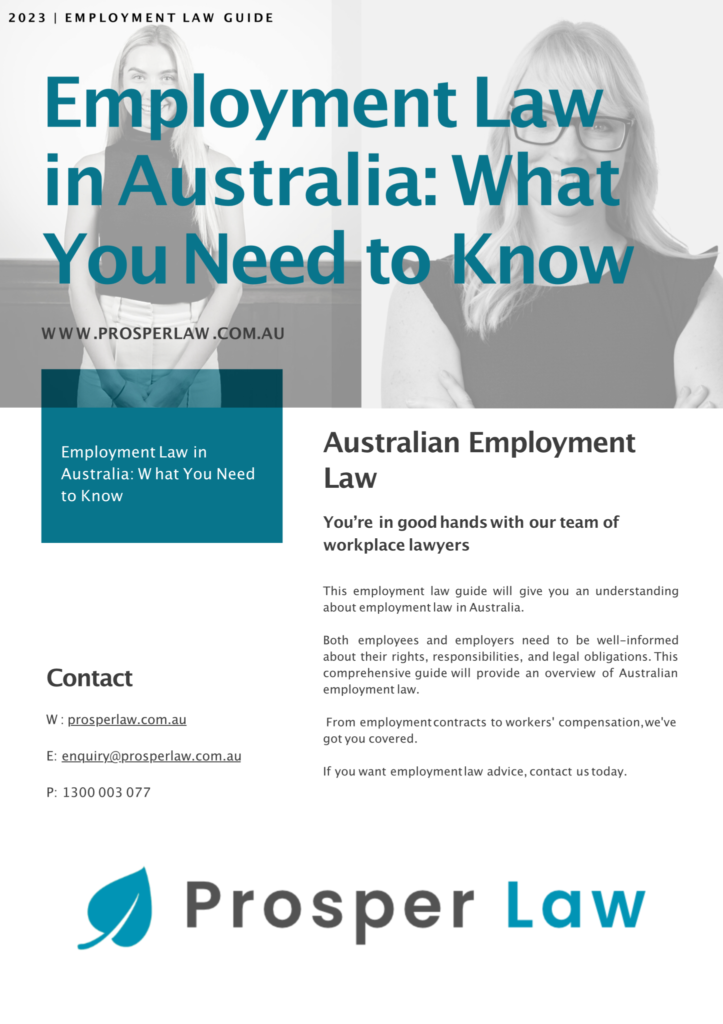The Fair Work Act 2009 is the cornerstone of employment law in Australia. It provides a framework for the rights and obligations of both employers and employees.
Whether you are running a large corporation or a small business, understanding and complying with the Fair Work Act is necessary to maintain a fair and legally compliant workplace.
Our employment lawyers have written this guide to help employers navigate key provisions of the Fair Work Act. Reading this article will help employers to meet their obligations and avoid potential legal pitfalls.
Key takeaways
- The Fair Work Act sets out national minimum standards for employment in Australia.
- Employers must comply with minimum employment standards, modern awards, and enterprise agreements.
- Unfair dismissal, workplace entitlements, and general protections are key areas where employers must exercise caution.
- Recent changes to the Fair Work Act impact areas like fixed-term contracts, parental leave, and workplace discrimination.

What is the Fair Work Act?
The Fair Work Act (2009) Cth is Australia’s primary legislation governing employment. It outlines the rights and responsibilities of employees and employers. It also establishes the Fair Work Commission (FWC) as the independent body responsible for dispute resolution, setting minimum wages, and managing workplace relations.
The key objectives of the Fair Work Act are to:
- ensure that all workers are protected by minimum workplace standards
- promote productive and flexible employment arrangements
- provide clear processes for resolving workplace disputes
Employers have obligations to provide employment records to employees, ensuring transparency and compliance with workplace laws.
National Employment Standards (NES)
At the core of the Fair Work Act are National Employment Standards (NES), which apply to all employees covered by the Act. These minimum standards form the foundation of employee entitlements. Its key standards include:
- Maximum Weekly Hours: Full-time employees can work up to 38 hours per week, with reasonable additional hours.
- Parental Leave: Up to 12 months of unpaid parental leave, with the option to request an additional 12 months.
- Annual Leave: Full-time employees are entitled to four weeks of paid annual leave per year.
- Personal/Carer’s Leave and Compassionate Leave: Full-time employees receive 10 days of personal leave annually for illness or caring responsibilities.
- Public Holidays: Entitlement to a paid day off on public holidays unless reasonably requested to work.
- Notice of Termination and Redundancy Pay: Requirements around notice periods and redundancy pay based on length of service.
Failure to comply with the NES can lead to legal action, financial penalties, and reputational damage for employers.
Modern Awards and Enterprise Agreements
The Fair Work Act also governs modern awards and enterprise agreements, which provide additional employment terms and conditions beyond the NES.
- Modern Awards: These are industry – or occupation-specific standards that cover wages, working hours, overtime, and penalty rates. Employers must ensure that employees are paid according to the correct award, or they could face wage disputes and penalties.
- Enterprise Agreements: These are negotiated agreements between an employer and a group of employees (or their representatives) that can override a modern award if they provide better overall terms (often referred to as the BOOT test).
Employers must carefully assess which modern award applies by interpreting coverage clauses in modern awards to ensure minimum conditions are met, as misclassification can lead to compliance issues.

Unfair Dismissal and Termination
Under the Fair Work Act, employers must follow fair dismissal procedures to avoid legal claims for unfair dismissal. Unfair dismissal occurs when an employee is terminated in a way that is harsh, unjust, or unreasonable.
Employers must provide valid reasons for termination, give employees an opportunity to respond to allegations, and follow proper procedures.
Unfair dismissal eligibility
There are eligibility requirements for submitting unfair dismissal applications. These include:
- the employee must have completed the minimum period of employment (six months for larger businesses, 12 months for small businesses).
- the employee must earn less than the high-income threshold (currently $167,500 per year) or be covered by a modern award or enterprise agreement.
If employers do not follow fair dismissal procedures, they may face orders for reinstatement, compensation, or penalties.
Small business employers need to follow the Small Business Fair Dismissal Code.
Workplace Discrimination and General Protections
The Fair Work Act includes provisions to protect employees from discrimination and adverse action based on protected attributes such as race, gender, disability, and sexual orientation.
The Act also includes protections for pregnant employees and employees who take sick leave.
Employers must ensure their workplace is free from discrimination, and any adverse action (e.g., dismissal or demotion) taken against employees because of a protected attribute can result in significant penalties.
Employers are also prohibited from taking adverse action against employees for exercising workplace rights, such as filing a complaint about workplace safety or disconnecting from work.
Recent Changes to the Fair Work Act
Employers should be aware of recent amendments to the Fair Work Act, including:
- Fixed-Term Contracts: It is now unlawful to engage employees on fixed-term contracts longer than two years, except in specific circumstances such as specialised tasks or projects.
- Parental Leave Requests: Employers must now respond in writing to requests for extended unpaid parental leave, and can only refuse such requests on reasonable business grounds.
- Anti-Discrimination and Sexual Harassment: Additional protections have been introduced, prohibiting discrimination based on new protected attributes and strengthening sexual harassment laws.
Employers must stay updated on legislative changes to ensure compliance with the latest employment law standards.
These changes are in addition to the Fair Work legislation changes implemented in 2023.

Frequently Asked Questions
Who does the Fair Work Act apply to?
The Fair Work Act generally applies to all employees and employers in Australia.
There are some exceptions in certain states where State public sector and local government employees are covered by state systems rather than the Fair Work Act.
What is the National Employment Standards (NES)?
The NES are minimum employment entitlements that must be provided to all employees covered by the Fair Work Act, including entitlements like annual leave, parental leave, and maximum working hours.
How does the Fair Work Act impact small businesses?
Small businesses must comply with the Fair Work Act, but the Small Business Fair Dismissal Code provides specific guidelines for handling dismissals, offering some flexibility for small employers.
What are modern awards, and how do they affect employment?
Modern awards set out minimum wages and conditions for specific industries or occupations. Employers must ensure that employees are paid according to the relevant award.
When drafting employment contracts, it’s important to understand how annualised salaries and set-off clauses in employment can affect award compliance and employee entitlements.
What is considered unfair dismissal under the Fair Work Act?
Unfair dismissal occurs when an employee is terminated in a way that is harsh, unjust, or unreasonable. Employers must provide a valid reason for termination and follow fair procedures to avoid legal claims.
The Fair Work Act is a comprehensive piece of legislation that provides a clear framework for employers in Australia to manage their workforce. Staying informed about your obligations under the Act, along with any recent changes, is crucial for avoiding disputes, penalties, and ensuring a fair workplace.




